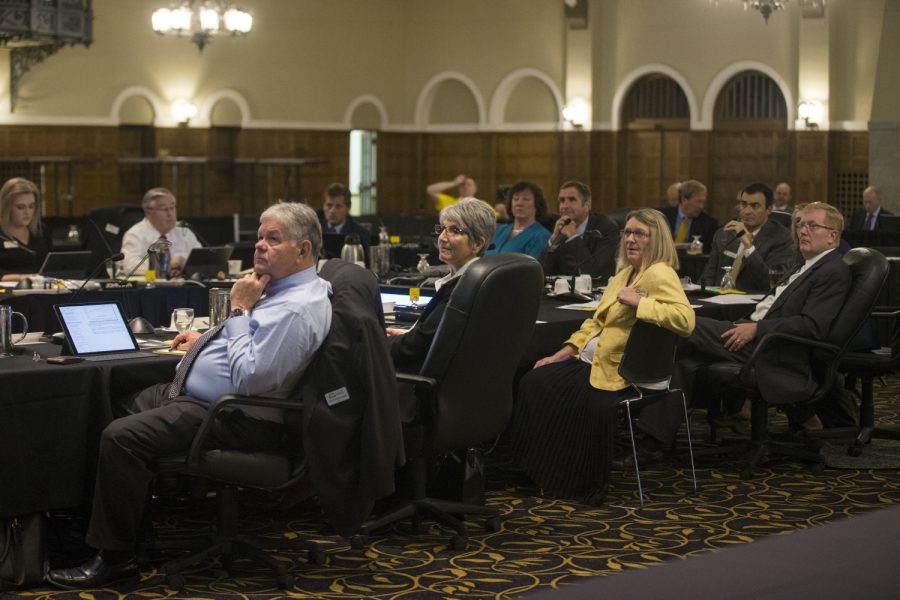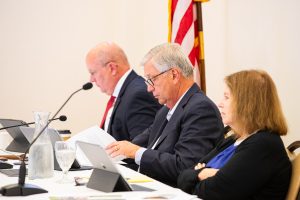Iowa regents to consider barring members from sports betting
The state Board of Regents will consider prohibiting regents and board office staff from participating in sports gambling on events in which its universities participate.
Board members listen during the Board of Regents meeting on September 12, 2018 in the IMU Main Lounge. Regents members discussed remodeling various buildings and sights across various Iowa campuses.
November 5, 2019
The state Board of Regents on Nov. 14 will consider whether to prohibit members and office staff from participating in sports betting on events involving its institutions.
The policy would prohibit regents and office staff from betting on any regent NCAA team, student athlete, or coach. The policy applies at any regulated or licensed gambling facility or regulated internet-betting sites.
Participation in fantasy sports contests on and off-line will not be affected by this policy, according to regents’ documents. The proposed policy will only apply to regents and office staff during their terms as regents or employment with the regents’ office.
RELATED: College betting sticking point in Iowa sports-gambling proposals
Regents and office staff would not be allowed to participate in sports gambling at any gambling facility licensed by the Iowa Racing and Gambling Commission, a commission for a state outside of Iowa, and those operating in accordance to the Indian Gaming Regulatory Act, the documents read.
Regents and office staff would be prohibited from providing information about teams, athletes, and coaches that is not already available to the public to wagering entities or individuals, according to the proposed policy.
The act which allowed sports waging and fantasy sports contests in Iowa was enacted in May and took effect in August.
University of Iowa Athletic Director Gary Barta told the Faculty Senate in October that the UI educated its student athletes on how to understand and combat sports gambling and betting.
RELATED: UI Athletics Director Gary Barta talks effects of pay-to-play, sports-betting laws
He said the department has made student athletes aware that innocent comments or questions from peers about a teammate’s performance may be perceived as sports wagering.
UI Athletics is also working to educate students working in the department — in addition to athletes — to understand how sports betting may affect them, Barta said.
“We have continued to increase our education on [sports betting],” Barta said at the Faculty Senate meeting. “We have 650 student athletes, and we certainly educate them. Our vulnerability and risk probably exist greater outside of that. It is something we are concerned about, and we have spent a lot of time and energy to improve [sports-betting] education.”
The UI’s Big Ten peer institutions have also expressed concern over the allowance of sports wagering and proposed policy changes to minimize conflicts of interest, Barta said, but the UI will not follow suit. Students, faculty, and staff will not be banned from participating in sports betting, he added.
The Big Ten hired an integrity-service company that will follow games on a moment-by-moment basis to keep the legitimacy of the sport in light of betting legalization, he said.
“I would love it if sports wagering was not legal in our state,” Barta said, “especially on collegiate students.”






